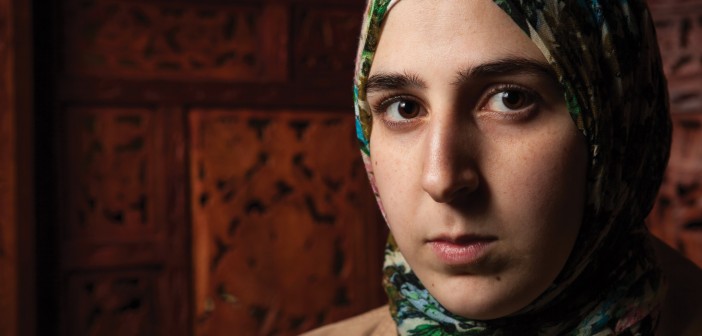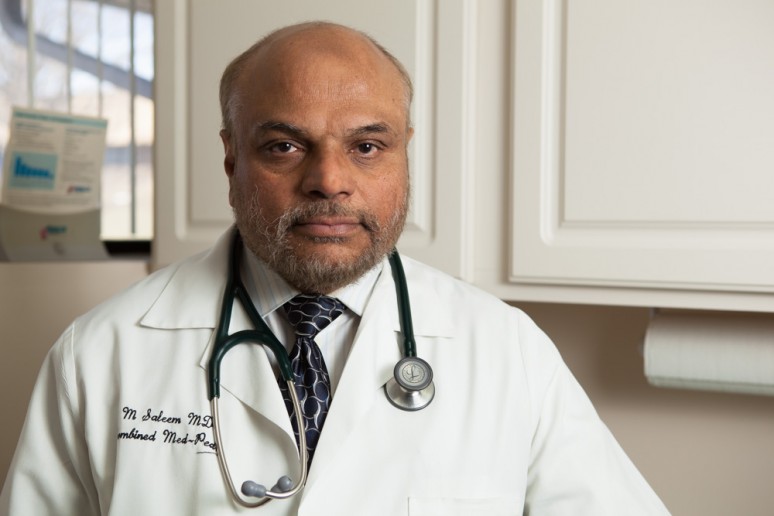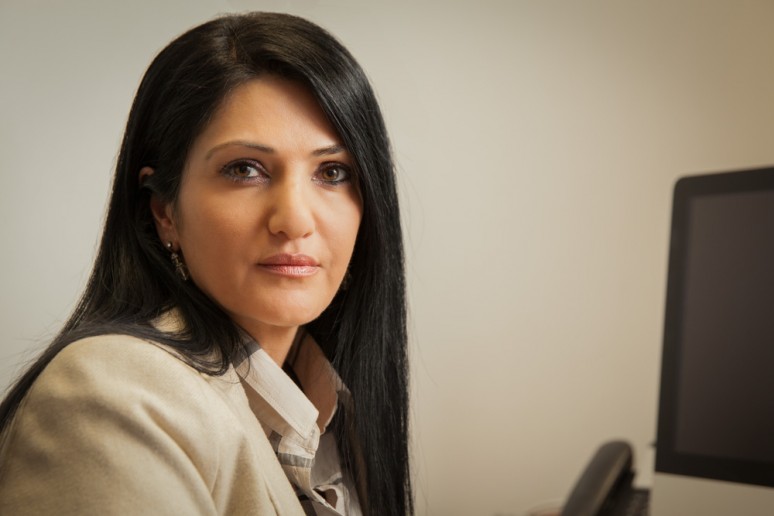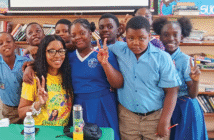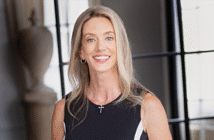Pause for a moment and consider the word Islam. What comes to mind? Images of terrorists boarding planes on September 11, hooded men executing Syrian soldiers and beheading Christians in the name of religion, an Iranian woman buried chest-level and stoned to death under Islamic law, or Muslim college students murdered in North Carolina might come to mind.
Repeated terrorist attacks and violent killings of innocent people under the pretext of religious beliefs are painting a disturbing picture of the word Islam today. Its Arabic origin means peace and submission to the will of God, not terror, and the religion itself represents not one person or ethnic group but the central ideas of its definition. The misconception that the people who make up the face of Islam condone hate and terrorism – combined with society’s ignorance of Islamic beliefs and shocking media reports referencing Islam – have resulted in a muddled definition of Islam in the minds of the non-Muslim community. The resulting effects are stereotypes, racism or indifference toward Muslim people in the Flint area and across the country.
Notwithstanding the varied connotations of the word Islam, there is one thing that the Muslim people of the Flint area would like the non-Muslim community to know: The Islam that they know and believe does not promote violence, hate or oppression.
“We are residents and patriotic Americans,” says Mohammed Saleem, M.D., who met with My City Magazine at the Flint Islamic Center to talk candidly about his faith. Dr. Saleem was born and raised in India and came to Flint in 1995 to complete his residency at Hurley Medical Center. Married with three adult children, he practices internal medicine in Davison and volunteers on local faith-based committees. One of those is ALPACT (Advocates and Leaders for Police and Community Trust), a group collaborating to decrease Flint-area crime and improve community trust.
Local followers of Islam would like their Flint-area neighbors to know that they strive to be peaceful, loving and merciful, and that they are active residents. “It’s partly our fault because we need to communicate that with the general community,” says Dr. Saleem, adding that drug and alcohol abuse and gambling are not problems in the Muslim community. “Our kids are top students,” he adds.
According to The Institute of Islamic Knowledge, Islam promotes the brotherhood of man, toleration of one another, sympathy for the unfortunate and cooperation for general human happiness. “Killing in the name of the religion opposes the faith,” explains Dr. Saleem, referencing the terrorist groups and leaders who claim to follow Islam. He turns to 5:32 of the Quran: “If anyone killed a person … it would be as if he killed all mankind, and if anyone saved a life, it would be as if he saved the life of all mankind.”
The Quran (also spelled Koran) is believed to be the last word of God revealed to the Prophet Muhammad and is the primary source of Islamic teachings. The Quran’s references to violence and war have been hotly debated. Local Muslims say that the term jihad has been misconstrued, not only by terrorists but also by news media and others who associate the term with the primary Merriam-Webster definition: “a holy war waged on behalf of Islam as a religious duty.”
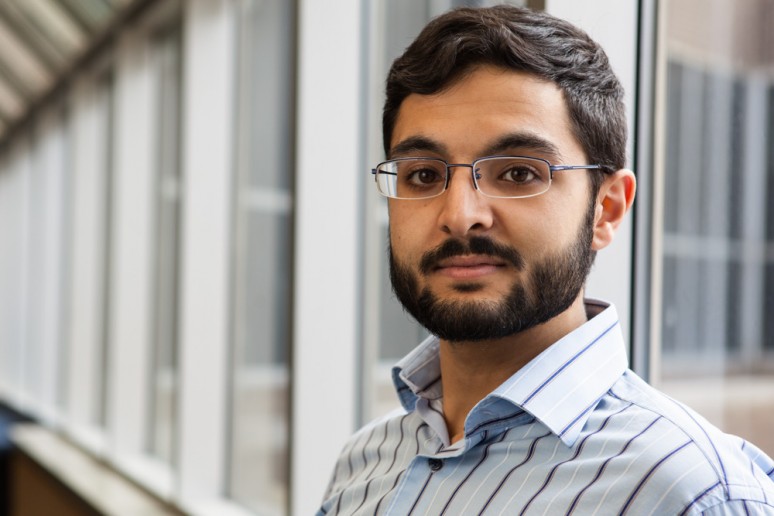
“Christians, Jews and Muslims are brothers and sisters in faith. While we have a different view of Jesus, peace be upon him, than Christians do, we at least share a love of him.”
Husam Alghanem
As defined by the Institute of Islamic Information & Education, jihad means to struggle or strive against evil thoughts, evil actions and aggression against a person, family, society or country. “Muhammad, peace be upon him, came for peace,” Dr. Saleem explains. “He was persecuted but he never responded to that. At the end of his time, he had to respond in battle to defend himself.”
As an indication of honor, the phrase “peace be upon him” is repeated by Islamic believers each time they say the name of a prophet. Prophets who are recognized in the faith include Noah, Abraham, Moses, Jesus, Muhammad and others; they are viewed as messengers who were sent by God to guide humanity, and each is deeply respected. “If anyone says anything negative about Jesus, peace be upon him, Muslims get upset too,” Dr. Saleem says. We believe in him as a prophet.”
The negative associations between the religion of Islam and terrorist groups in the news are frustrating local Muslim people, building a sense of unrest at being compared to such terror. “ISIS are not Muslims,” says Dr. Saleem. “Who they are, we’re not sure. They killed innocent people who were helping the Muslims, and they have killed thousands of Muslims or anyone who does not pay allegiance to them. They’re brainwashing young people. What they’re doing is completely against Islam.”
The enforcement of Sharia law, or Islamic law in many Muslim-majority countries such as Iran, Iraq, Pakistan and Afghanistan pushes another cloud of confusion and controversy over the term Islam. The practice allows brutal punishment for certain acts, for example the amputation of limbs for theft, death by public stoning or “honor killings” for adultery and lashing for the consumption of alcohol.
Under Sharia law, before a person is condemned to stoning for adultery, there must be four witnesses to the adulterous act. “I feel that stoning is a political thing because it’s not likely that four people will witness that,” says Dr. Saleem. “Mostly, there are cultural and social differences in the practice of Islam in these countries. In Afghanistan, they are not letting girls go to school. There is no basis in the Quran for that. There are variations of Muslim marriage ceremonies and celebrations, and in some countries, men can marry up to four women.”
As Americans, our deeply ingrained and varied values and beliefs influence our perceptions of the religion of Islam, whether negatively, positively or indifferently. “I definitely feel like most people don’t understand the faith at all,” says Husam Alghanem, a young Muslim man studying medicine at the University of Michigan in Ann Arbor and Flint. Husam took a break from his studies to discuss what Islam means to him personally. “Christians, Jews and Muslims are brothers and sisters in faith. While we have a different view of Jesus, peace be upon him, than Christians do, we at least share a love of him.”
Husam has similar views toward terrorist groups committing barbaric acts in the name of Islam. “They are evil,” he says. “As I see it, some violent, manipulative people saw a power void in the chaos of Syria and Iraq. They then latched on to a beautiful ancient religion, Islam, and mutated it completely to suit their goals. Their goals are just personal power for themselves, and it hurts me that they claim to know anything about Islam.”
An Arab American, Husam was born and raised in Flint. His parents, Abd and Fadwa Alghanem moved to the U.S. from Syria in the early ‘80s. He explains that his father was a top medical student in Syria and came to the U.S. to start a new life and to further his career. “In my mind, my parents embody the American dream,” he says. “My dad is a self-employed surgeon and my mom got an MBA to run his office. They came here, started from scratch and worked as hard as possible.” His father, Dr. Abd Alghanem, is a plastic surgeon and served on the Michigan Board of Medicine.
Husam recalls a few instances of racially-biased comments directed toward him by random strangers. Though he has not been physically attacked on account of his faith or appearance, he knows other Muslim people who have been attacked or verbally confronted or who have had trouble sleeping due to anxious thoughts about hate crimes and incidents inflicted against Muslims and Arab Americans in recent months. “There is definitely more of a sense of feeling unsafe,” he says of the Muslim community. “The fact that I have a beard sometimes makes people see me a different way.”
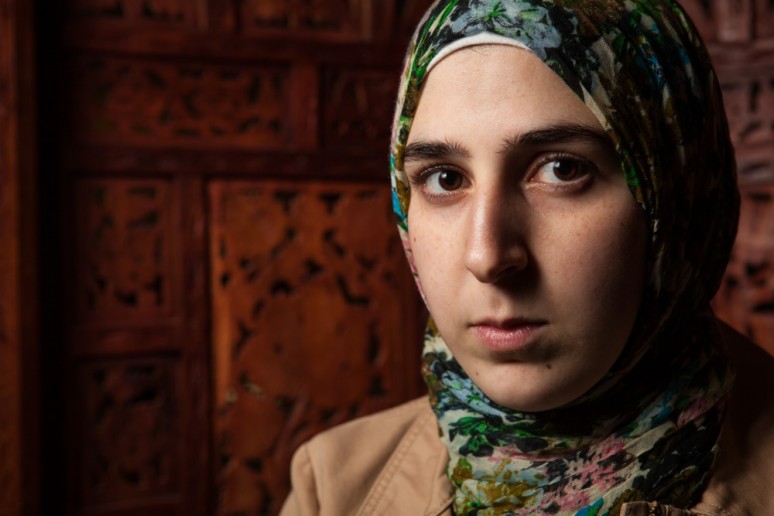
“My religion, which I live and breathe, is equated with terrorism on a daily basis, when all I have ever been taught is that Islam is about showing kindness to your neighbor and greeting others with a smile.”
Salaam Tarakji
Racism and a sense of fear toward Muslims and Arab Americans, as well as people of the Sikh religion who wear turbans, increased after the September 11 attacks. Mosques have been burned. Six Sikhs were murdered inside a Wisconsin temple in 2012. The recent killings of three innocent Muslim students in Chapel Hill, NC and the murder of an Iraqi Muslim immigrant in Texas, who had recently joined his wife in the U.S. and was killed while watching snow fall for the first time, are incidents that deeply concern the local Muslim community. Muslims and non-Muslims alike came together to hold vigils in the aftermath of these events and to show that living in a peaceful society matters to them.
“The recent killings of three young, caring and innocent Muslim students illustrates how the unwarranted hatred towards Muslims is on the rise in America,” says Salaam Tarakji, a soft-spoken Muslim woman who is enjoying her first year of teaching math to high school students at the Flint Islamic Center’s Genesee Academy. “My religion, which I live and breathe, is equated with terrorism on a daily basis, when all I have ever been taught is that Islam is about showing kindness to your neighbor and greeting others with a smile.”
Salaam graduated from U of M-Flint in 2013 with a double degree in Mathematics TCP (Teacher Certificate Program) and Psychology. She was actively involved in the Muslim Student Association there, an organization dedicated to erasing Muslim stereotypes and increasing cultural awareness. As a member of the MSA, Salaam and other students raised money to build wells in Africa and, for Islam Awareness Week, they handed out roses to illustrate the theme: Loving your community. “It put smiles on people’s faces,” she recalls. “We are part of the community and we do try to make a difference, especially with youth.” Salaam has helped children of the Flint Islamic Center Youth Group to volunteer for Flint’s Day of Dignity and at the North End Soup Kitchen, and they have also visited elderly residents at local assisted living facilities.
Recently engaged and looking forward to building her own family in the Cleveland, Ohio area and working toward a master’s degree in educational administration, Salaam likes the diversity that is an inherent value of Islam. She points out the Flint Mosque consists of over 20 different nationalities and that the beauty of this diversity is supported in the 49th Chapter of the Quran.
Husam also enjoys the diversity within Islam. “Muslims, especially in the United States, are varied, including African-Americans, South Asians, Arabs, Bosnians and more,” he says. Along with Muslim friends, he also socializes with friends who follow other religions. “I feel more brotherhood toward someone who is spiritual and of a different faith than someone without any faith,” he explains.
Despite this level of diversity in Islam, there is much work to be done to chip away at the stereotypes in America to promote tolerance and understanding. Stereotypes felt by Arab-American Muslims are also encountered by Arab Americans of other faiths. “Not all Arabs are Muslim and not all Muslims are Arabs,” says Mona Sahouri, Executive Director of the Arab American Heritage Council (AAHC) in Downtown Flint. She interacts closely with Arab American families and students throughout Genesee County, and she has noticed a growing sense of exclusion and fear among them. “The media has viewed Arabs and Muslims through a certain lens. They don’t make the news unless it’s bad. There is a true lack of understanding of Islam as a religion.”
Mona points to an increasing number of scathing racist social media posts against Muslims and Arab Americans in America, which directly oppose their Constitutional right to live freely with dignity and respect in their home communities and without fear or a segregated mentality. “The Arab community here feels very uncomfortable and alienated right now,” she says. “When a community of individuals is giving everything they have for this country, and are made to feel as second class citizens, they feel isolated. The situation in America has become very toxic.”
The AAHC supports local Arab Americans by providing immigration and language services, conducting workshops and cultural sensitivity seminars and advocating for them on local and national levels. The organization is leading a Take On Hate campaign to address issues of bias and discrimination affecting all people. The AAHC encourages Arabs and Muslims to be involved in their communities but wants other residents to take active roles in reaching out to them.
“Some of the Arab Americans are less likely to take the first step,” Mona says. “Silence means you’re compliant. Take the first step. Make them feel like you understand. If we want to make sure that our city is on the right path and guarantees civil liberty for all, then inclusion is the first thing to do.”
Likewise, Husam encourages people to be curious and work up the courage to ask questions of Arab Americans and Muslims alike. “Muslims have different ways of incorporating their life and their religion, so try to talk to as many as possible. Be sincere and your goodwill will show,” he says. ♦
Muslims Believe In:
♦ One and Only God (Allah) with all His unique attributes
♦ Angels created by Him
♦ All the Holy Books originally revealed to the different Prophets, including the Torah, Psalms, Gospel (Bible) and the Quran
♦ All the Prophets through whom God sent His Message to mankind including Noah, Abraham, Ishmael, Isaac, Jacob, Joseph, Moses, David, Jesus and Muhammad, peace be upon them all
♦ The Day of Judgment and the individual’s accountability for good and bad deeds
♦ Al-Qadar, which means God knows what has happened and what will happen
Source: The Institute of Islamic Knowledge
Photography by Mike Naddeo

